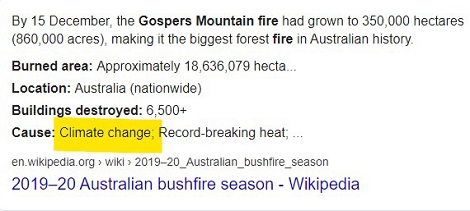It is now a key test of political faith or heresy that the media ask Australian politicians if climate change caused the current spate of extreme bushfires. If the politicians—who have no special qualification to know—answer “yes”, they pass the test; if they answer no, they are the equivalent of heretics in the Spanish Inquisition.
For months, mainstream media headlines in Australia and around the world have screamed that Australia is burning up due to climate change. At the Davos World Economic Forum on 22 January, teenage climate activist Greta Thunberg—who also has no special qualification to know—stood in front of a dramatic image of a kangaroo fleeing an Australian bushfire and declared, “Our house is still on fire. Your inaction is fuelling the flames by the hour.”
On 3 February 2020, this was given weight by more than 250 scientists—who are supposed to be qualified to know—who signed “An open letter on the scientific basis for the links between climate change and bushfires in Australia.”1 Their letter opened: “Scientific evidence unequivocally links human-caused climate change to the increasing risk of frequent and severe bushfires in the Australian landscape.” Under the heading “The scientific basis”, the statement continued: “Human-caused climate change is increasing the risk of fires in various regions of the world, including Australia.” This sentence was footnoted to a 1988 CSIRO paper, a 2008 economist’s study, two Intergovernmental Panel on Climate Change (IPCC) studies from 2014 and 2019, and a 2020 ScienceBrief review of the Fifth IPCC Assessment from 2013,2 by the Tyndall Centre for Climate Change Research at the University of East Anglia.
It is curious that the scientists’ open letter would footnote the Tyndall Centre’s ScienceBrief, as it does not state for Australia what the open letter states; in fact, it contradicts the open letter.
On the surface, it supports the general thesis that climate change is causing worse bushfires. The ScienceBrief’s summary of the 2013 IPCC Assessment states: “The impact of anthropogenic climate change on fire weather is emerging above natural variability.” Citing a 2019 study by the University of Idaho’s John Abatzoglou and two colleagues, “Global Emergence of Anthropogenic Climate Change in Fire Weather Indices”,3 the ScienceBrief continued: “By 2019, models suggest that the impact of anthropogenic climate change on fire weather was detectable outside the range of natural variability in 22 per cent of global burnable land area.” It frankly admitted that attributing fire weather to man-made climate change was a difficult statistical task due to other human factors, including changes to land cover, population growth, fire suppression activities, and the limits of satellite-based fire records that don’t go back further than the 1970s.
Nevertheless, the Abatzoglou study cited by the ScienceBrief review claimed that it has achieved detection of climate change as a factor in fires in 22 per cent of the earth’s burnable land area. This 22 per cent includes the Amazon, Mediterranean, Scandinavia and Western North America.
The problem for the signers of the open letter is this: It does not include Australia! (Nor does it include Siberia.) Moreover, although the study was published before the current bushfires, the authors state they do not expect to be able to detect human-induced climate change in Australian bushfires before 2040, and even that assumes the most extreme scenario for CO2 emissions.
The scientists who have signed the open letter and are linking the current bushfires to human-induced climate change are departing radically from the up-to-date review of the latest research. While that may become the “consensus” in the future, it would require a good deal of careful study of the 2019-20 bushfires which is yet to be done, and therefore it cannot be stated now.
This report in no way endorses the claim of human-induced climate change causing bushfires, but is intended to show the extreme inaccuracies in current mainstream media reporting in Australia, and the confusion even among scientists who believe in dangerous human-induced climate change. It is dishonest for mainstream media reporters to demand unqualified politicians state whether climate change caused Australia’s bushfires when scientists who are climate change alarmists cannot even agree.
Meanwhile, it is a scientific fact that whatever the climate conditions, bushfires are far more intense and deadly when the fuel load has been allowed to build up to unmanageable levels. No matter how many degrees by which climate change activists believe we can reduce global temperature by reducing CO2 emissions, extreme bushfires will continue to rage out of control so long as we fail to manage the fuel loads.
Footnotes
1. https://australianbushfiresandclimatechange.com/
2. https://sciencebrief.org/briefs/wildfires
3 . https://agupubs.onlinelibrary.wiley.com/doi/ full/10.1029/2018GL080959
By Robert Barwick, Australian Alert Service, 5 February 2020








